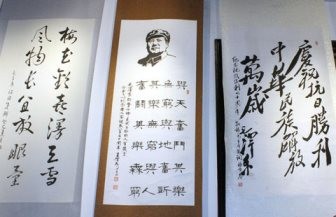The Communist Party of China (CPC) received recognition from various foreign experts and scholars for its governing capacity and efforts to fight corruption during the 94th anniversary of the founding of the Party, the Xinhua News Agency reported.
Mohamed Abdel-Wahhab al-Saket, a former Arab League ambassador to China, praised the CPC's achievements that he said have drawn global attention.
According to al-Saket, the CPC has led Chinese people in accomplishing two historic missions: national independence and economic prosperity. He added that in more than 90 years' history, the Party has elevated China's international status and national strength to a level higher than it was before.
The former ambassador said that since Xi Jinping assumed the post as general-secretary of the CPC Central Committee, the Party has paid serious attention on two main tasks.
"The first is to deepen comprehensive economic reforms under the slogan 'economic new normal.' It includes promoting new high-tech industries and eliminating outdated ones, simplifying administrative examinations and approvals to stimulate market vitality, establishing several free trade regions to enlarge opening to the outside world, etc.," al-Saket said.
"The second is to harshly crackdown on corruption under the slogan 'eliminating tigers and flies together,'" the former Arab League diplomat added.
In addition, he praised the institutional reforms undertaken by the CPC that sought to establish a long-term anti-corruption mechanism, and strengthen international cooperation to catch corrupted officials who have fled overseas.
"By taking these anti-corruption measures, [the] CPC has increased its popularity among Chinese people and consolidated its ruling foundation," al-Saket said.
Yakov Berger, a senior researcher with the Institute of Far Eastern Studies of the Russian Academy of Sciences, noted the strict orders and discipline as the core of the CPC's forceful management and supervision.
Berger said that the CPC's fight against corruption over the past two to three years has yielded fruitful results as well as showed the determination of the Party leadership to fight corruption.
Igor Denisov, a senior researcher at the Center for East Asia and Shanghai Cooperation Organization Studies at Moscow State Institute of International Relations, said that China's anti-graft campaign involved all authorities and administrative departments in China, including sensitive institutions of the military and security department.
Zheng Yongnian, director of the East Asian Institute in Singapore, said that the 18th CPC National Congress in 2012 has brought the issue of anti-corruption to a new level, which the new leadership has put on top of its agenda.
Zheng noted that the corruption probe regarding the military has earned wide support, and the whistle-blowing website launched by the disciplinary body of the CPC enabled ordinary citizens to easily report corrupt officials.



























